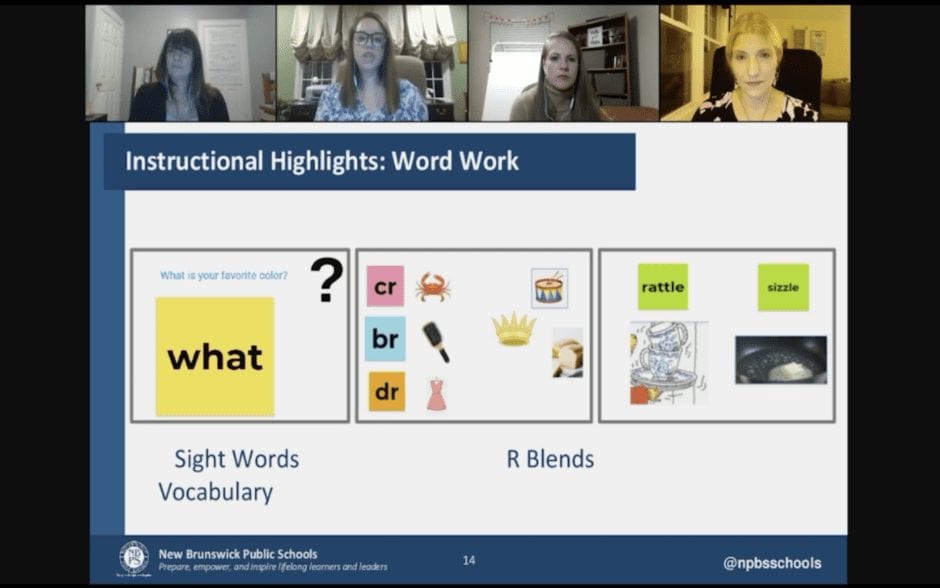The Remote Route to Literacy Development
By Michele Israel
WATCH THE EDLEADER PANEL RECORDING
Your school has made headway on literacy development. Students are reading more and thinking critically about what they write. And then there’s, well, a pandemic. Teaching and learning move out of the classroom into the virtual world, putting literacy gains at risk.
How do you continue developing your students’ reading and writing skills from afar? How do they avoid the COVID slide potential?
In a recent edLeader Panel, sponsored by Scholastic Digital Solutions, teachers from the New Brunswick Public Schools (NBPS) in New Jersey shared how they moved their guided reading program to a virtual environment, keeping reading and writing skills afloat during these tumultuous times.
Shifting the Reading Environment
NBPS boasts a research-based guided reading program. It encompasses a range of literacy strategies and tools introduced in stages to help learners at all academic levels build their reading and writing. Prediction, sight-word recognition, phonics, decoding, scaffolded learning, high-level questions, monitoring for meaning, reading groups, word work and coaching and questioning are several among many approaches in the literacy development toolkit.
When COVID hit and schools closed, teachers wondered how to bring this successful program into the virtual learning environment with the same student reach and impact.
They had to consider critical factors:
- Appropriate tech tools that students and teachers could access and successfully use.
- Lessons that matched students’ specific needs with scaffolds to address their reading levels.
- Engagement of learners, especially the youngest, in meaningful activities (not just busy work) on days their guided reading groups did not meet with teachers.
The larger issue was how to plan and where to start to continue preparing, empowering and inspiring their students to be literate lifelong learners and leaders.
Going Virtual: The Strategy
The team tapped the experts first: teachers, reading specialists, and administrative representatives. Willing to try new things, they met a few times a week to map out approaches that drew on the NBPS’ guided reading protocol.
The critical first step: exploring numerous platforms and tools to decide on what would work best. To do this, they shared lesson plans, gave each other feedback to refine them, and then videotaped them to test on the different types of technology.
Using the district’s Guided Reading Lesson Planner, the team linked in screencasts of “homemade” tech-based tutorials, footage of actual teaching in action to model best practices. They added instructional tips and strategies so teachers had everything they needed in a ready-to-implement package.
The team also curated lessons for virtual learning that teachers could use if they did not develop their own. They bolstered their lessons tech tools that include:
- Jamboard, a virtual collaborative whiteboard that a teacher used to have students practice matching pictures to letter blends.
- Google Apps such as Docs and Slides that teachers use to provided text-based writing extensions.
- Flipgrid where students can record themselves reading text to determine where they need assistance; and where students listen to their reading members read assigned text.
- Scholastic Literacy Pro, a collection of leveled ebooks that learners can read online.
- Scholastic F.I.R.S.T., an adaptive learning platform focused on foundational reading skills, word study and phonics.
All the students learned to use the different platforms and their interactive tools, (how to mute and unmute, for example, for individual assistance and group work) and the guided reading instruction began.
The Look of Remote Reading Instruction
With these tools in place, the virtual guided reading lesson is as good as the classroom version. Ebooks offer readers a trove of themes to explore; digital instructional collaboration occurs across classrooms, grade levels, and even other schools to develop lesson resources; and the platforms allow for sharing the screen for group lessons.
Teachers have been able to negotiate the technology and distance to provide students with individual and group support while other students read independently. Small groups meet twice a week so that a few students benefit from more targeted instruction. Even though they are not rotating through classroom centers in real time, students can still engage with text multiple times for different purposes.
The NBPS team recognizes that there are different guided reading programs, but the tools they recommend can leverage the planning and teaching of lessons across most.
What Made it Work
Aside from teacher commitment to reshaping the program to work in the virtual realm, the program benefitted from broader support:
- The department provided the teachers with many resources to match literacy skills to students and offered concrete examples of what those skills and strategy lessons looked like in practice.
- Teacher leadership was in full play. They volunteered to share their work and make their processes transparent, allowing for the development of quality lessons, tips, strategies and collegial coaching.
- The district listened to the teachers about centering on time for small-group instruction. Every morning, there is whole-group instruction, the afternoons dedicated to small groups in which guided reading holds a sacred place.
The team acknowledges that coming back into the virtual classroom this year was smoother. The teachers were empowered because they had the time they needed to teach reading effectively. And, because everyone was on the same page with what was important: building the literacy skills students need to be successful readers.
This edWeb broadcast was sponsored by Scholastic Digital Solutions.
WATCH THE EDLEADER PANEL RECORDING
This article was modified and published by eSchool News.
About the Presenters
Danielle Mastrogiovanni is an educator and activist who has always been fueled by the belief that all children deserve access to schools that provide opportunities for them to grow both academically and emotionally. With over two decades of experience, Danielle has created and implemented culturally responsive curricula for children at all grade levels. Danielle has also served as a literacy coach and most recently transitioned into a leadership role where she is currently the supervisor of both English language arts and social studies. In addition to speaking at multiple local and state forums, her work around the teaching of diverse perspectives and inclusive history has been showcased by EdWeek. Danielle is currently conducting research on district-level leadership and the sustainability of culturally responsive systems.
Michelle Hagerty Silano is a K-4 reading specialist who has over a decade of experience in education. She is very passionate about helping children grow as readers through small group reading instruction. Michelle completed her master’s level action research project at Rutgers University on guided reading and strategy groups. She presented this research at the Rutgers University Reading and Writing Conference. Prior to her role as a reading specialist, Michelle was a first grade teacher for eight years. In addition to her reading specialist certificate, Michelle also holds her supervisor certificate and is currently working to become an Orton Gillingham certified educator.
Stephanie Miele is a second grade special education teacher who is in her tenth year of teaching. She has experience working as a pre-kindergarten teacher and as an inclusion teacher in kindergarten, first grade, and second grade classrooms. Stephanie is motivated daily by her students and is passionate about using guided reading instruction to support her students’ reading growth. Currently, Stephanie is pursuing her master’s degree in reading and supervision from Rutgers University and hopes to one day become a literacy specialist.
Jessica DeLuca is a first grade teacher and has spent her 14-year career teaching in the primary grades. Jessica earned her dual master’s degree in elementary education and child development. She believes that a strong foundational education is vital for student success. Jessica teaches with the hope of instilling a passion for learning based in curiosity, empowerment and the belief that all children are capable of amazing things. In addition to her classroom teaching, Jessica created a mentor program for at-risk students in her school that services around 150 students from 2nd – 8th grade. Jessica was honored to be recognized as a 2018 Exemplary Elementary Educator by the New Jersey Department of Education.
Suzanne Lucas is Vice President of Product Marketing for Scholastic Education Digital Solutions. Suzanne, a former first grade teacher, works across Scholastic supporting new program development and marketing.
Join the Community
Be a Literacy Hero is a free professional learning community on edWeb.net dedicated to helping educators activate every student’s greatest superpower: the power of literacy.
Scholastic Education’s digital solutions help educators impact their students’ literacy achievement where it’s needed most. Through access to 1000s of high-quality ebooks and research-based digital literacy tools, their child-centric digital products develop students’ literacy skills leading to fluent readers for life.
Michele Israel writes about the ideas and best practices that are shared in edWeb’s edWebinars so they can spread innovative and best practices to the education community. Michele owns Michele Israel Consulting, LLC, which serves large and small educational, nonprofit, media, corporate, eLearning, and blended-learning organizations to bolster products and programs. Her rich career spans over 25 years of successfully developing educational materials and resources, designing and facilitating training, generating communication materials and grant proposals, and assisting in organizational and program development. In addition to lesson plans and other teacher resources, Michele’s portfolio includes published articles covering a range of educational and business topics.




Comments are closed.